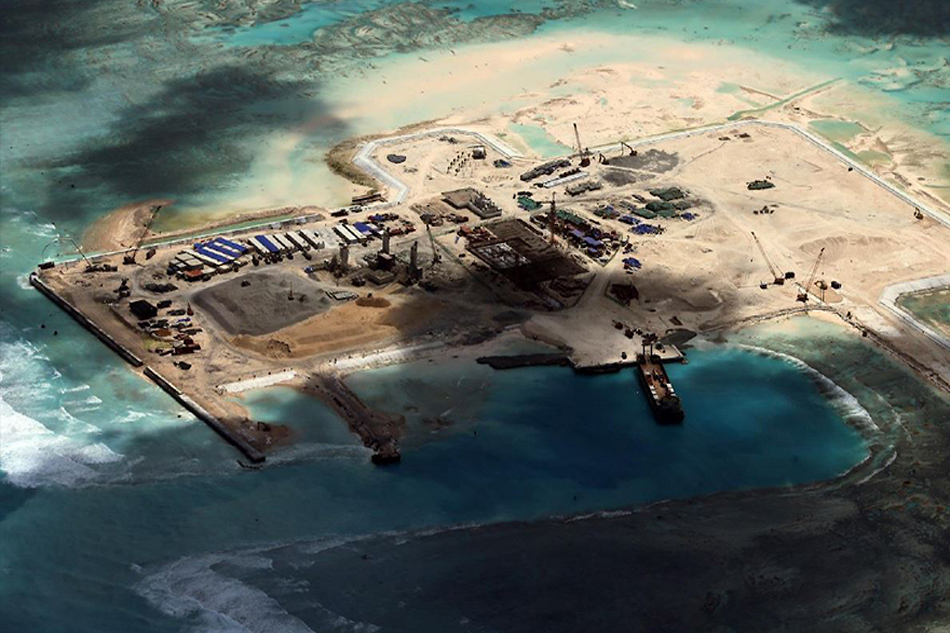China 'betraying' Xi's promise not to militarize S. China Sea: US | ABS-CBN

Welcome, Kapamilya! We use cookies to improve your browsing experience. Continuing to use this site means you agree to our use of cookies. Tell me more!
China 'betraying' Xi's promise not to militarize S. China Sea: US
China 'betraying' Xi's promise not to militarize S. China Sea: US
Kyodo News
Published Jul 12, 2019 10:03 AM PHT
WASHINGTON - The United States on Thursday condemned China for betraying President Xi Jinping's 2015 promise not to militarize the South China Sea, saying Washington strongly opposes Beijing's attempts to assert its "unlawful" claims in the strategic waterway.
WASHINGTON - The United States on Thursday condemned China for betraying President Xi Jinping's 2015 promise not to militarize the South China Sea, saying Washington strongly opposes Beijing's attempts to assert its "unlawful" claims in the strategic waterway.
State Department spokeswoman Morgan Ortagus made the statement on the eve of the third anniversary of an arbitral ruling that invalidated China's claims to most of the South China Sea.
State Department spokeswoman Morgan Ortagus made the statement on the eve of the third anniversary of an arbitral ruling that invalidated China's claims to most of the South China Sea.
"China's militarization of disputed outposts in the South China Sea betrays President Xi's 2015 commitment not to engage in such activity," Ortagus said at a press briefing.
"China's militarization of disputed outposts in the South China Sea betrays President Xi's 2015 commitment not to engage in such activity," Ortagus said at a press briefing.
"It is provocative, complicates the peaceful settlement of disputes, threatens the security of other nations, and undermines regional stability," she said.
"It is provocative, complicates the peaceful settlement of disputes, threatens the security of other nations, and undermines regional stability," she said.
ADVERTISEMENT
On July 12, 2016, the Permanent Court of Arbitration in The Hague invalidated China's "nine-dash line," through which Beijing claims almost all of the South China Sea. Beijing, however, has rejected the ruling.
On July 12, 2016, the Permanent Court of Arbitration in The Hague invalidated China's "nine-dash line," through which Beijing claims almost all of the South China Sea. Beijing, however, has rejected the ruling.
The Philippines filed the arbitration case against China in January 2013 to seek clarification of its maritime entitlements in the South China Sea under the 1982 U.N. Convention on the Law of the Sea, following Beijing's aggressive assertion of its claims there.
The Philippines filed the arbitration case against China in January 2013 to seek clarification of its maritime entitlements in the South China Sea under the 1982 U.N. Convention on the Law of the Sea, following Beijing's aggressive assertion of its claims there.
On Thursday, Ortagus said the United States urges all parties to conform their maritime claims to international law, and to resolve their territorial and maritime disputes peacefully, based on the rule of law, not by force.
On Thursday, Ortagus said the United States urges all parties to conform their maritime claims to international law, and to resolve their territorial and maritime disputes peacefully, based on the rule of law, not by force.
China has conflicting territorial claims with Brunei, Malaysia, the Philippines, Vietnam and Taiwan in the South China Sea, a strategic waterway through which more than one-third of global trade passes.
China has conflicting territorial claims with Brunei, Malaysia, the Philippines, Vietnam and Taiwan in the South China Sea, a strategic waterway through which more than one-third of global trade passes.
==Kyodo
==Kyodo
ADVERTISEMENT
ADVERTISEMENT


